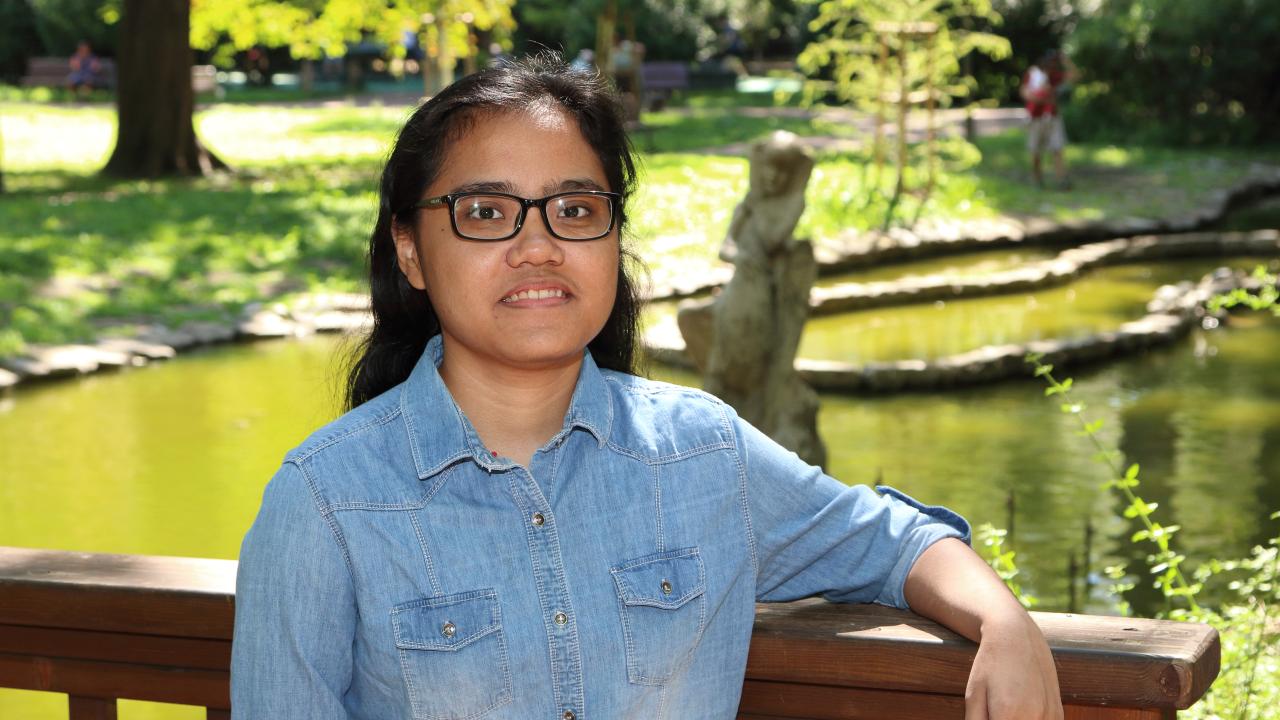
Top students in their final years of secondary school are often steered towards engineering or medicine, practical professions that can contribute to a country and society. That’s what happened to Poetri Tarabunga, an Indonesian scientist who recently graduated from ICTP’s Postgraduate Diploma Programme. But medicine and engineering are not the only professions that have contributions to make, as exemplified by the many inventions and ideas humans now benefit from thanks to basic science. Luckily, some students like Poetri are drawn to basic research and physics despite being expected to become an engineer, and ICTP is excited to support her as she begins her career in science.
“Ever since elementary school, I really loved science and especially mathematics,” says Poetri. “During my Bachelor’s degree I majored in engineering, and that was where I first got interested in physics. With the courses geared towards engineering, the professors didn’t explain many physics concepts in detail, but I was really interested and decided to learn more on my own,” she remembers. “I decided to switch to physics and apply to come to ICTP.”
Poetri first heard of the Centre from ICTP scientist Mikhail Kiselev. During a visit to Poetri’s university, Kiselev combined a seminar on his work with an introduction to the Diploma Programme, and to Tarabunga it sounded like what she was looking for. “I didn’t feel like I had enough background in physics to apply to PhD programmes yet,” she says. The Diploma Programme seemed like a great way to get the background she wanted in preparation for diving into research.
At ICTP, Poetri excelled. Awarded the top prize in her section, Condensed Matter and Statistical Physics, she will continue to work with ICTP scientists next year as part of the joint ICTP PhD programme with SISSA (the Scuola Internazionale Superiore di Studi Avanzati), also based in Trieste. As a Diploma student, Poetri worked with ICTP scientist Marcello Dalmonte investigating entanglement, one of the key mysteries of quantum mechanics. “I’m excited to keep exploring topics in this field as I start my PhD,” says Poetri.
The unexpected complications of the global pandemic made an already intense year of study that much more difficult for the Diploma students, Poetri included. “It was quite difficult at the beginning of the lockdown,” she says. “With everything going on, it felt like I lacked motivation to attend classes, but I adapted and got used to it.” It was the in-class lectures she missed most: “In person is always better than online classes, but everyone made it work well despite that.” The many body fundamentals course taught by Professor Alexander Nersesyan was Poetri’s favorite class. “I really liked how the professor taught it. He explained the concepts very well and in a way that makes you interested to know more.”
After completing her PhD work, Poetri wants to continue to do postdoctoral work and pursue a career in basic research in condensed matter physics. “Since elementary school, I was always known as the math girl,” she remembers. “There was definitely societal pressure to study engineering instead of math, as usually the top students do engineering or medicine,” explains Poetri. “That was what got me into engineering at first. But now that I have switched to physics, I am finally where I belong and I am not looking back. And my family accepts my decision to be a physicist,” says Poetri. “Engineering and physics are different perspectives on knowledge. While engineering focuses on applications, it does not delve in the theory much, which I am very interested in.”
Poetri also enjoyed the Diploma Programme’s international environment. “There are so many different cultures represented here,” says Poetri, “and it’s nice to experience a different culture while living in Italy.” The help of the ICTP Visa Office helped her decide to stay to continue her studies in Trieste after graduating from the Diploma Programme. “I received some offers for PhD positions in the US, but it was a very difficult visa situation and I decided to stay.” With many scientific researchers living outside their home countries, this can be a common problem, despite the many benefits researchers can bring to a community and country. “In my country building a research career is very hard,” explains Poetri. “There is a lack of funding and researchers to work with there, so I am excited to have the opportunity to explore research topics and work with the great researchers here.”
Poetri is looking forward to beginning her PhD work, with the background knowledge she wanted, thanks to the Diploma Programme. Her advice for future Diploma students is all about persistence: “It is a very intense programme, but if you work hard you will be able to do well.”
----- Kelsey Calhoun
















